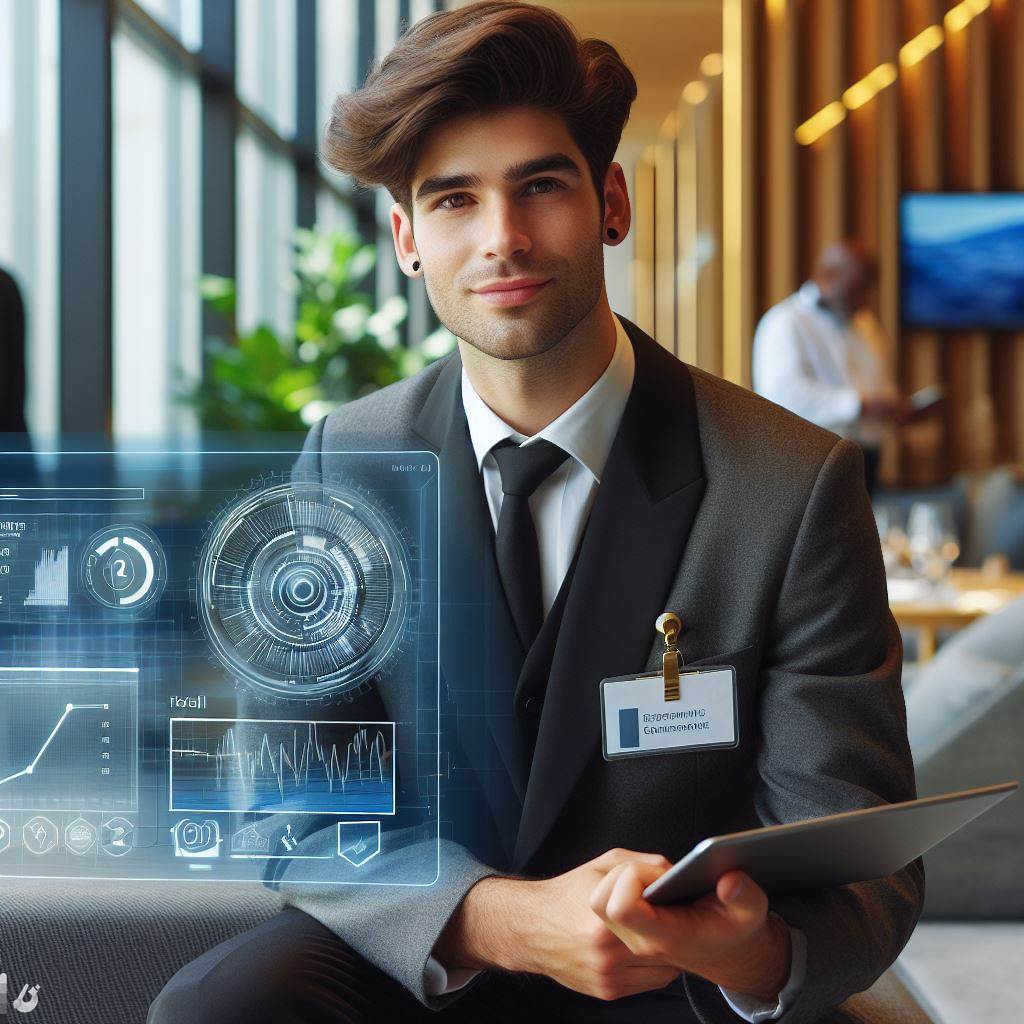Introduction
Hotel management is a complex field that requires efficient technology to thrive in the competitive hotel industry.
Technology plays a vital role in enhancing the overall guest experience, increasing operational efficiency, and streamlining management processes.
The importance of technology in the hotel industry cannot be overstated.
Technology enables hotels to automate various tasks, such as reservations, check-ins, and check-outs, making the process more convenient for guests.
Moreover, it improves communication between staff members, enables real-time updates, and enhances customer service.
By incorporating technology into their operations, hotels can effectively manage inventory, track guest preferences, and personalize experiences.
Automated systems can track customer data and provide valuable insights for marketing and sales strategies.
In addition to guest-facing technology, hotel management systems help streamline internal operations.
Tools like property management systems (PMS) and revenue management systems (RMS) enable hotel managers to efficiently handle bookings, payments, and room availability.
These systems also help optimize pricing strategies and revenue forecasting.
Technology further enhances hotel security measures.
Advanced access control systems and surveillance cameras ensure guest safety and prevent unauthorized access.
Additionally, technology can assist in more sustainable practices, such as energy management systems and automated lighting controls, reducing energy consumption and environmental impact.
In fact, technology plays a crucial role in hotel management by improving guest experiences, optimizing operations, and enhancing security measures.
Embracing technological advancements is vital for hotels to stay competitive in today’s fast-paced industry.
By incorporating the right technology, hotels can efficiently manage their operations, exceed guest expectations, and achieve long-term success.
How technology has transformed customer experience in hotels
Technology has revolutionized the hotel industry, providing enhanced customer experiences and streamlining various processes.
Here, we will explore how technology has transformed customer experience in hotels:
Online Booking Systems and Mobile Apps
- Hotels now rely on online booking systems and mobile apps to facilitate seamless reservations.
- Customers can easily browse and compare room rates, amenities, and reviews before making a booking.
- With just a few clicks, guests can secure their preferred accommodations from anywhere in the world.
- Online booking systems ensure accuracy, efficiency, and convenience for both guests and hotel staff.
- Mobile apps offer added advantages, such as personalized recommendations and loyalty program perks.
Self-Check-In and Check-Out Processes
- Technology has enabled self-check-in and check-out processes, reducing wait times at the front desk.
- Guests can complete these procedures using kiosks or their mobile devices, bypassing long queues.
- Automated systems validate identification, process payments, and provide room keycards effortlessly.
- These technologies enhance efficiency, allowing guests to settle in quickly and start enjoying their stay.
- Self-check-out allows guests to expedite their departure, without the need for manual interaction.
Integration of Smart Devices in Hotel Rooms for Personalized Experiences
- Hotels now incorporate smart devices, such as voice assistants and IoT-connected gadgets, in guest rooms.
- Guests can control various aspects of their room, including lighting, temperature, and entertainment, using voice commands or mobile apps.
- Smart devices offer personalized experiences by remembering guest preferences and adjusting settings accordingly.
- Guests can enjoy a seamless entertainment system, streaming their favorite shows and movies on smart TVs.
- Moreover, these devices serve as digital concierges, providing valuable information and recommendations.
In short, technology has significantly transformed the customer experience in the hotel industry.
Online booking systems and mobile apps simplify the reservation process, making it more convenient and efficient for both guests and hotel staff.
Self-check-in and check-out processes reduce waiting times, allowing guests to settle in quickly and depart effortlessly.
The integration of smart devices in hotel rooms enhances personalization and control, creating a more comfortable and tailored experience.
As technology continues to evolve, hotels must adapt and leverage these innovations to stay competitive and provide unparalleled hospitality.
Read: Navigating COVID-19: A Travel Agent’s Guide
The impact of technology on hotel operations
Property Management Systems (PMS) for efficient operations
Property management systems (PMS) play a crucial role in the efficient operation of hotels.
These systems have replaced manual processes and transformed hotel management in several ways.
PMS allows hotels to centralize their operations by managing various tasks through a single platform.
Reservations can be made, modified, or canceled easily, without the need for extensive paperwork.
The system keeps track of room availability and rates, making it effortless to manage bookings and maximize occupancy.
Check-ins and check-outs have become a seamless process with PMS. Guests can check-in online, reducing wait times at the front desk.
The system also enables efficient billing and payment processing, ensuring a smooth experience for both guests and hotel staff.
Furthermore, PMS provides tools for comprehensive guest profile management.
Hotels can gather guest data and preferences, leading to personalized experiences and targeted marketing campaigns.
This helps in building customer loyalty and increasing guest satisfaction.
Improved inventory management and housekeeping processes
Technology has greatly enhanced inventory management in hotels.
With the help of digital systems, hotels can monitor their stock levels in real-time.
Automated notifications alert staff when supplies are running low, eliminating the risk of stockouts or overstocking.
This ensures that necessary amenities, toiletries, and other essential items are always available for guests.
Housekeeping processes have also benefited from technology.
Digital checklists and mobile applications have replaced traditional pen and paper, making it easier for housekeeping staff to manage their tasks efficiently.
Room status updates, maintenance requests, and cleaning schedules can be instantly communicated through the system, ensuring rooms are prepared promptly for new guests.
Additionally, technology has enabled the use of smart devices and sensors in hotel rooms.
These devices can detect occupancy, monitor energy usage, and adjust temperature settings automatically, resulting in energy savings and improved operational efficiency.
Use of automation and artificial intelligence in streamlining hotel operations
Automation and artificial intelligence (AI) have transformed the way hotels operate.
Chatbots and virtual assistants have become popular tools for handling guest queries and providing quick customer service.
These AI-powered systems can answer frequently asked questions, offer recommendations, and even process room service requests.
Guests can receive timely assistance without the need for human intervention.
Moreover, robots are being utilized in hotels for various tasks.
They can assist with room service delivery, handle luggage, and perform housekeeping duties.
Robots are particularly advantageous during peak times or when there is a shortage of available staff.
They not only save time and labor costs but also provide a unique and memorable experience for guests.
AI technology also enables data analysis and predictive analytics in hotel operations.
Hotels can analyze guest behaviors, booking patterns, and preferences to make informed business decisions.
This information helps hotels optimize room rates, create targeted marketing campaigns, and improve overall operational efficiency.
In essence, technology plays a vital role in hotel management, impacting various aspects of operations.
Property management systems streamline tasks such as reservations and billing.
Inventory management and housekeeping processes have improved with real-time monitoring and digital checklists.
Automation and artificial intelligence enhance guest services and assist with tasks like room service and housekeeping.
Embracing technology is crucial for hotels to stay competitive and provide exceptional guest experiences.
Read: The Impact of Technology on Travel Agents
The role of technology in enhancing guest communication and satisfaction
In the digital age, technology has revolutionized the way hotel management interacts with guests, allowing for more efficient and personalized communication.
By leveraging cutting-edge tools and resources, hotels can enhance guest satisfaction and create a memorable experience.
Use of chatbots and virtual assistants for 24/7 guest support
One significant way technology has impacted hotel management is through the use of chatbots and virtual assistants.
These automated systems provide round-the-clock guest support, addressing queries and concerns instantly.
Whether it’s booking a room, inquiring about amenities, or requesting room service, chatbots offer a quick and convenient way for guests to communicate with the hotel.
This instant response capability enhances guest satisfaction, as it eliminates the need to wait for human assistance.
Furthermore, chatbots can handle multiple guest requests simultaneously, ensuring efficient and timely responses.
Their ability to provide accurate information and immediate assistance contributes to an overall positive guest experience.
Unlock Your Career Potential
Visualize a clear path to success with our tailored Career Consulting service. Personalized insights in just 1-3 days.
Get StartedTechnology enables personalized interactions and tailored recommendations
Technology plays a crucial role in facilitating personalized interactions between hotel staff and guests.
With the help of guest management systems, hotels can gather valuable information about their guests’ preferences, interests, and previous stays.
By analyzing this data, hotels can create tailored recommendations for each guest, ensuring that their needs and expectations are met.
For instance, if a guest has a preference for a specific type of cuisine, the hotel can make relevant dining recommendations or even personalize the in-room dining menu.
Moreover, hotels can use technology to send personalized messages and offers to guests.
This level of personalization makes guests feel valued and appreciated, leading to increased guest satisfaction and loyalty.
Role of online reviews and feedback systems in improving guest satisfaction
Technology has empowered guests to share their experiences through online reviews and feedback systems.
These platforms provide a valuable source of information for both hotels and potential guests.
Hotels can monitor and analyze online reviews to gauge guest satisfaction levels.
By identifying areas for improvement, hotels can address any concerns promptly and enhance the overall guest experience.
Responding to reviews also reassures potential guests that their feedback is valued and taken seriously.
Additionally, hotels can utilize feedback systems to gather direct input from guests during their stay.
By seeking guests’ opinions, hotels can identify areas of strengths and weaknesses, enabling them to make necessary improvements and ensure higher guest satisfaction.
In general, technology has significantly transformed guest communication and satisfaction in hotel management.
Chatbots and virtual assistants provide 24/7 guest support, while personalized interactions and tailored recommendations enhance the guest experience.
Furthermore, online reviews and feedback systems allow hotels to actively listen to guest feedback and make necessary improvements.
Embracing technology is essential for hotels striving to stay competitive and deliver exceptional guest experiences.
Read: The Best Travel Agent Software Tools in 2024

You Might Also Like: The Art of Flair Bartending in Canada
The importance of data analytics and technology in revenue management
Data analytics and technology play a crucial role in revenue management within the hotel industry.
By enabling the collection and analysis of data, technology allows hotels to develop effective pricing strategies.
With the help of technology, hotels can gather various types of data including booking patterns, guest preferences, and market trends.
This data is then analyzed to identify patterns and trends that can be used to optimize pricing strategies.
Traditionally, revenue management involved manual data collection and analysis which was time-consuming and prone to errors.
However, with the advent of technology, hotels can automate this process, saving time and improving accuracy.
Role of revenue management systems in optimizing revenue generation
Revenue management systems (RMS) play a crucial role in optimizing revenue generation.
These systems utilize sophisticated algorithms and data analysis techniques to identify demand patterns, forecast occupancy levels, and recommend optimal pricing strategies.
By integrating with other hotel systems such as the property management system (PMS) and channel management system (CMS), RMS can provide real-time data updates and ensure seamless pricing across various distribution channels.
An effective revenue management system not only helps in maximizing revenue but also enhances guest satisfaction.
By analyzing historical data, these systems can identify peak demand periods and enable hotels to adjust their pricing accordingly.
Revenue management systems also provide valuable insights into market trends, allowing hotels to stay competitive and adjust their pricing strategies based on factors such as seasonality, local events, and competitor rates.
Customer relationship management (CRM) systems are another essential tool for revenue management.
These systems enable hotels to track guest preferences, behaviors, and interactions, allowing for targeted marketing campaigns.
By analyzing guest data, hotels can personalize marketing messages and offers, increasing the chances of conversion.
CRM systems also facilitate guest retention efforts by allowing hotels to tailor their services based on individual preferences and provide personalized experiences.
Moreover, CRM systems enable hotels to segment their customer base and identify profitable customer segments.
This information can then be used to design targeted marketing strategies to attract and retain these valuable customers.
In a nutshell, data analytics and technology are essential components of revenue management in the hotel industry.
They enable the collection and analysis of data for effective pricing strategies.
Revenue management systems optimize revenue generation, while CRM systems aid in targeted marketing and guest retention efforts.
Embracing these technological advancements can significantly enhance a hotel’s revenue and overall performance.
Read: Travel Agents: Specializing in Luxury Travel
Technology’s contribution to sustainability in hotel management
Technological advancements have greatly influenced the management of hotels, particularly in terms of sustainability.
In this section, we will explore how technology contributes to sustainability practices in hotel management, focusing on energy management systems, water conservation, waste management, and monitoring and optimization of sustainable practices.
Use of energy management systems to reduce environmental impact
Energy management systems have played a crucial role in reducing the environmental impact of hotels.
These systems utilize advanced sensors and controls to optimize energy consumption.
By monitoring energy usage, hotel managers can identify areas of inefficiency and take corrective measures.
This not only reduces the carbon footprint but also leads to significant cost savings.
Moreover, technology has revolutionized the promotion of water conservation and waste management in hotels.
Many hotels now use smart sensors and meters to track water usage in real-time.
By analyzing this data, hotel staff can identify water leakage and implement effective measures to conserve water.
Additionally, smart technology enables the automation of waste management processes, ensuring proper disposal and recycling of waste materials.
Role of technology in promoting water conservation and waste management
Furthermore, technology plays a crucial role in monitoring and optimizing sustainability practices in hotels.
With the help of IoT devices and data analytics, hotel managers can continuously monitor and evaluate their sustainability efforts.
Real-time data provides insights into energy consumption, water usage, waste management, and carbon emissions.
This information enables managers to make data-driven decisions and implement strategies to further enhance sustainability practices.
How technology enables the monitoring and optimization of sustainability practices
In addition to data monitoring, technology facilitates the optimization of sustainability practices.
For instance, energy management systems can automatically adjust temperature and lighting settings based on occupancy and natural light availability.
This ensures optimal energy usage without compromising guest comfort.
Similarly, smart irrigation systems can adapt watering schedules based on weather conditions, minimizing water wastage in hotel gardens and landscapes.
Moreover, the use of technology in sustainability practices enhances guest engagement and awareness.
Many hotels now provide interactive displays in guestrooms, showcasing the energy and water usage of individual guests.
This not only educates guests about their environmental impact but also encourages them to participate in sustainable practices.
Some hotels even offer incentives such as loyalty rewards for guests who actively engage in sustainability initiatives.
Furthermore, the adoption of technology in sustainability practices helps hotels meet and exceed regulatory requirements.
With the implementation of energy management systems and efficient waste management processes, hotels can comply with environmental regulations and certifications such as LEED (Leadership in Energy and Environmental Design).
This not only enhances their reputation but also attracts environmentally conscious guests.
Basically, technology plays a vital role in promoting sustainability practices in hotel management.
Energy management systems reduce the environmental impact and deliver cost savings.
Technology enables water conservation and waste management through sensors and automation.
Monitoring and optimization of sustainability practices are made possible by real-time data analysis.
Ultimately, technology enhances guest engagement, awareness, and helps hotels meet regulatory requirements.
Embracing technology is crucial for hotels to achieve long-term sustainability goals.
Conclusion
Technology plays a significant role in hotel management by improving efficiency and enhancing guest experiences.
Throughout this blog post, we have discussed various ways in which technology has transformed the industry.
From online reservations and check-ins to automated room service and personalized guest preferences, technology has revolutionized the way hotels operate.
By embracing innovative technologies, hotels can streamline operations, reduce costs, and provide a seamless experience for their guests.
Online platforms and mobile apps enable guests to book rooms conveniently, while automated systems improve housekeeping and maintenance processes.
Moreover, technology has allowed hotels to gather and analyze data, helping them understand customer preferences and tailor their services accordingly.
This level of personalization creates a unique and memorable experience for guests, leading to customer loyalty and positive reviews.
However, the role of technology in hotel management is ever-evolving.
As new technologies emerge, such as artificial intelligence, virtual reality, and blockchain, there are even more opportunities for the industry to innovate and enhance guest satisfaction.
Therefore, it is crucial for hoteliers to keep up with the latest technological advancements and continuously explore ways to integrate them into their operations.
By embracing and investing in innovative technologies, hotels can stay ahead of the competition and provide exceptional experiences for their guests.
All in all, technology is not just a tool for convenience in hotel management but a fundamental aspect that drives success and customer satisfaction.
So, let us continue to explore and embrace new technologies to reshape the future of the hotel industry.




